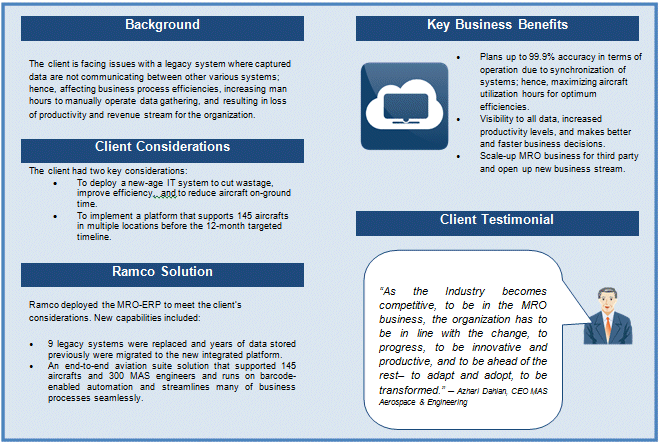The aviation industry is the most transformative industry in the history of air transportation overall. Airlines are facing smaller profit margins because of cost reductions required in the face of increasing fuel prices, all while facing stiff competition from budget airlines operating at lower costs. It is particularly competitive to be sustainable and profitable despite the challenges that the aviation industry faces in its role in global economic growth. Against rising challenges, airlines must operate more efficiently to deliver increasingly personalized customer experiences and manage the complexity of the data environment by leveraging seamless new cloud technology.
Project OPTIMIS: MAS takes to the skies with the Ramco Cloud
Malaysia Airline Systems (MAS) is the flag carrier of Malaysia, a member of the Oneworld airline alliance, and flies to over 60 destinations worldwide. It has two subsidiary airlines: Firefly which flies to tertiary cities and MASwings which operates its inter-Borneo flights. MASkargo operates freight flights and aircraft cargo-hold services for all Malaysia Airlines’ passengers. MAS Engineering provides services for aircraft maintenance, repairs, and overhaul (MRO) to international customers. Started as a commercial flight in 1947, MAS has evolved from a domestic carrier to now flying international routes connecting Malaysia to the world. With its brand known to many travelers and a history of outstanding warm hospitality, MAS is a national icon and it endeavors to maintain the hallmark of excellence by improving its business processes and efficiencies to be operational ready, to deliver first-class services for its passengers, and to maintain the safety and air worthiness of its fleets. The global airline industry is always changing to meet the demands of its customers and MAS needs all the responsiveness and resiliency that it can get to be competitive. Using tools powered by the cloud as enablers to reinvent and redefine the way it works with its customers will significantly benefit the company.
Situational Analysis
MAS has been operating with 14 systems in its IT landscape and most of those are non- interdependent operated using a legacy system. From the engineering and operations standpoint, the influx of data poses a challenge as the system requires conventional methods of data input that involve laborious work to gather, compile, and integrate. With 145 aircrafts from different fleets, the amount of data kept and accumulated through the years needed migration to a better system because data that was being captured and pumped into one stream was not shared with other systems, resulting to inefficiencies in MAS’s large organization. The profound impact of the system’s inefficiency led to the inability to make faster and better decisions during operations due to the lack of visibility of captured information and an inability to feed data to the appropriate channels. Consequently, productivity levels and revenue were negatively affected. As MAS faces stiff competition from its industry peers, the need to be agile and innovative and to be adaptive to the current MRO business landscape is crucial because highly effective technology is critical to ensuring the most efficient operations and to scale up the MRO business.
The Solution
Ramco Systems automates process-intensive activities; thus, optimizing operational and MRO activities. It provides support for 145 of MAS’s aircrafts and equips 300 MAS engineers (800 more in July 2016) with an integrated seamless platform for many engineering functions, simplifies compliance checks, and improves inventory management and hanger maintenance. As a result, 9 legacy systems were replaced and data was successfully migrated to the MRO – Enterprise Resource Planning (ERP) platform that allows integration into a single dashboard that enables inventory of the organization, tracking of work, and automation of certain processes seamlessly into any device; therefore, allowing staff access at anytime and anywhere to work on real-time data. The process will further improve the aircraft on-ground (AOG) reduction time and maintain continuous airworthiness. Using barcode-enabled features and automation will enhance the agility of the supply chain performance.
Benefits Achieved
The transition into Ramco Systems was carried out in record time for the fastest roll-out, go-live deployment that was achieved within 11 months; a month earlier than the previously targeted timeline. This was the largest IT project to be deployed in the history of MAS. It is enhanced with the capabilities of a holistic MRO-centric business ecosystem that is up-to-date with new-age technology that is hosted on the cloud platform. The new implementation will help cut waste, improve MAS’s overall business processes and operations, reduce workload, increase employee efficiencies and further trim AOG time. Automation of business processes allows higher levels of aircraft utilizations and further optimization in the use of fixed assets, such as hangars. This will also enhance planning capabilities by decreasing turnaround time for MAS and its third-party aircrafts; thereby, effectively increasing third-party MRO business, which, in turn, opens up a new avenue of business. Presently, MAS aims to grow and expand its business in line with the changing technology landscape, such as mobile connectivity and platforms that will create new customer experiences, and sophisticated use of data analytics that will provide organizational intelligence in planning and decision making; hence, saving time, increasing productivity, and; ultimately increasing profitability.




